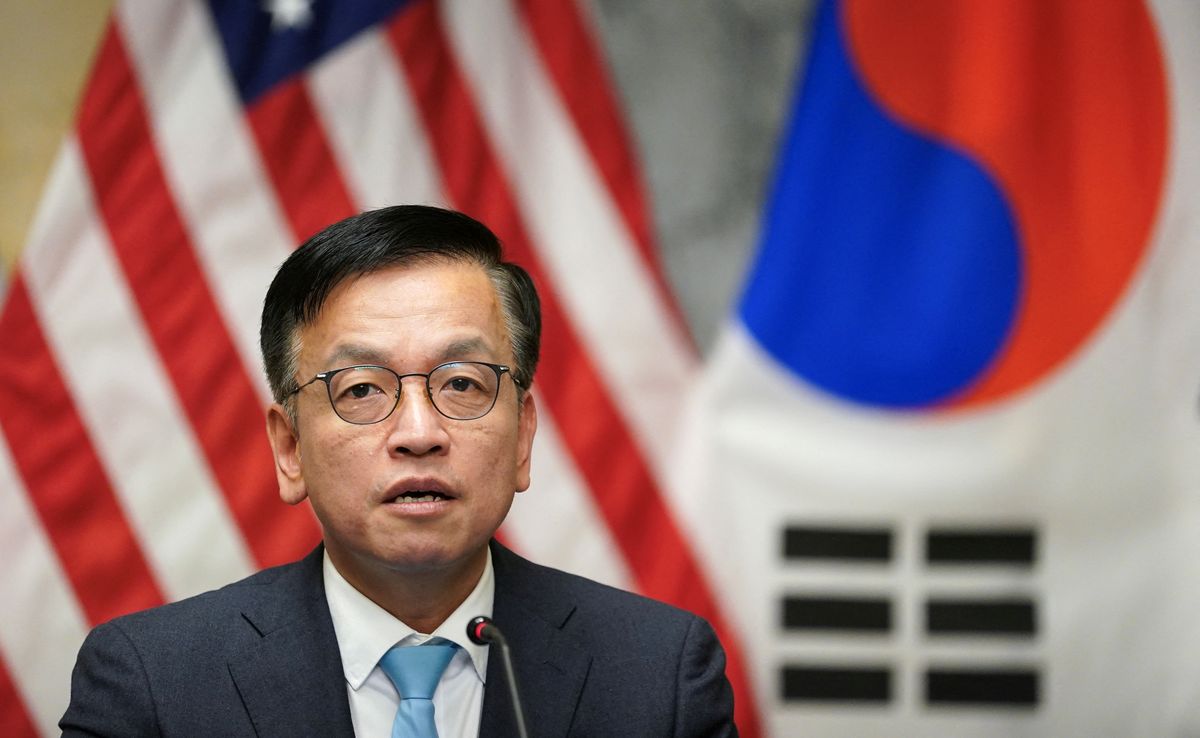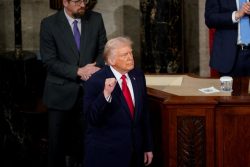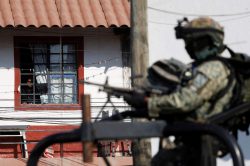
Korean Finance Minister Choi Sang-mok speaks during a trilateral meeting with U.S. Treasury Secretary Janet Yellen and Japanese Finance Minister Shunichi Suzuki on the sidelines of the IMF/G20 meetings, at the U.S. Treasury in Washington, U.S., April 17, 2024.
10:24 JST, December 4, 2024
SEOUL (Reuters) – South Korea’s finance ministry said on Wednesday it is ready to deploy “unlimited” liquidity into financial markets if needed after President Yoon Suk Yeol lifted a martial law declaration he imposed overnight that pushed the won to multi-year lows.
The announcement came after Finance Minister Choi Sang-mok and Bank of Korea Governor Rhee Chang-yong held emergency meetings overnight, and ahead of the BOK’s extraordinary meeting session abruptly scheduled for 9 a.m. local time (0000 GMT) on Wednesday.
“All financial, FX markets as well as stock markets will operate normally,” the government said in a statement.
“We will inject unlimited liquidity into stocks, bonds, short-term money market as well as forex market for the time being until they are fully normalized.”
The country’s financial regulator is ready to deploy 10 trillion won ($7.07 billion) in a stock market stabilization fund any time, the Yonhap news agency said.
South Korea’s won trimmed losses early on Wednesday, coming off the two-year low of 1,443.40 hit overnight after Yoon lifted his shock martial law declaration, honoring a parliamentary vote against the measure.
South Korea’s parliament, with 190 of its 300 members present, unanimously passed a motion on Wednesday requiring the martial law be lifted.
Korean shares fell nearly 2% at open but also pared losses. Chipmaker Samsung Electronics fell 1.31%, while battery maker LG Energy Solution slid 2.64%.
The KOSPI index and won are among Asia’s worst performing assets this year.
Overnight, U.S.-listed South Korean stocks fell, while exchange-traded products in New York including iShares MSCI South Korea ETF and Franklin FTSE South Korea ETF lost about 1% each.
“Martial law itself has been lifted but this incident creates more uncertainty in the political landscape and the economy,” ING economists wrote.
The political turmoil comes as Yoon and the opposition-controlled parliament clash over the budget and other measures.
The opposition Democratic Party last week cut 4.1 trillion won from the total budget proposal of 677.4 trillion won ($470.7 billion) the Yoon’s government submitted, putting the parliament in a deadlock over control of the 2025 annual budget.
The parliamentary speaker on Monday stopped the revised budget from going to a final vote.
A successful budget intervention by the opposition would deal a major blow to Yoon’s minority government and risk shrinking fiscal spending at a time when export growth is cooling.
“The negative impact to the economy and financial market could be short-lived as uncertainties on political and economic environment could be quickly mitigated on the back of proactive policy response,” Citi economist Kim Jin-wook said in a report.
Top Articles in News Services
-

Survey Shows False Election Info Perceived as True
-

Hong Kong Ex-Publisher Jimmy Lai’s Sentence Raises International Outcry as China Defends It
-

Japan’s Nikkei Stock Average Touches 58,000 as Yen, Jgbs Rally on Election Fallout (UPDATE 1)
-

Japan’s Nikkei Stock Average Falls as US-Iran Tensions Unsettle Investors (UPDATE 1)
-

Trump Names Former Federal Reserve Governor Warsh as the Next Fed Chair, Replacing Powell
JN ACCESS RANKING
-

Producer Behind Pop Group XG Arrested for Cocaine Possession
-

Japan PM Takaichi’s Cabinet Resigns en Masse
-

Man Infected with Measles Reportedly Dined at Restaurant in Tokyo Station
-

Israeli Ambassador to Japan Speaks about Japan’s Role in the Reconstruction of Gaza
-

Videos Plagiarized, Reposted with False Subtitles Claiming ‘Ryukyu Belongs to China’; Anti-China False Information Also Posted in Japan






















